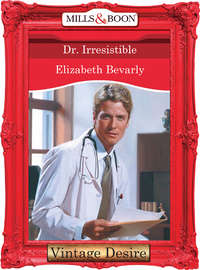
Полная версия
You've Got Male
Then she turned to make her way back to the front door, completing the journey without looking back once, and was relieved when the delivery guy followed her. But his pace was slow and relaxed, as if he were in no hurry, and somehow that made Avery want to hurry even more. Although his hands were shoved carelessly into the pockets of his jacket, she couldn’t help worrying that there might be something else in those pockets that could be potentially harmful to her. Like, oh…she didn’t know…a gun, perhaps. Or a knife. Some rope, maybe. Or duct tape.
Amazing all the dangerous things that would fit easily into a man’s jacket pocket, she marveled. Though somehow she suspected his hands would be the most dangerous weapon of all.
He was starting to look menacing again, and it occurred to her how truly isolated she was in her life. She didn’t know any of her neighbors and honestly wasn’t sure if any of them would respond to an anguished cry in the night. Not that they’d even hear an anguished cry this time of night, because they were probably all asleep, as normal people were at four-something in the morning.
And if something terrible did happen to her, who would she turn to in the fallout? Avery hadn’t spoken to anyone in her family for nearly a decade, and she didn’t kid herself that something like an assault or molestation on her part would change that. On the contrary, were her person to be violated, it would just make the rest of the family that much more determined to avoid her. The Nesbitts of East Hampton were still trying to rebuild their social standing in the wake of their youngest child’s exploits. She doubted they’d even send flowers to her funeral.
Her mouth went dry at the thought of her funeral. Or maybe it was because her visitor came to a halt in front of her with scarcely a breath of air separating them. If he did decide to be menacing instead of majestic, he could easily overpower her and no one would be the wiser.
Oh, who was she kidding? He could choose to be majestic, too, and she’d still end up a puddle of ruined womanhood at his feet.
Her heart was hammering hard in her chest again, but surprisingly it wasn’t because she felt threatened by him. No, what Avery was feeling was infinitely more dangerous and more potent than fear. What she was feeling was hunger, plain and simple. And it wasn’t for the bags of groceries this guy had just delivered. It was for an altogether different sort of package that he had.
Without thinking, she dropped her gaze to the package in question and saw that his jeans hugged him there as intimately as they did elsewhere. And it was a very nice package indeed. When she realized what she was doing, she snatched her gaze back up again, forcing herself to look at his face. But he was smiling at her in a way that told her he knew exactly what she’d been looking at. Worse, he knew she liked what she saw.
“Thanks again,” she said as she pulled the front door open and moved behind it. But the words came out sounding breathless and needy and in no way grateful.
“Anytime,” he told her as he took a few steps forward. But he halted at the threshold and turned to look at her one last time. Then he lifted a hand to his forehead in something of a salute and smiled at her. “And, sweetheart, I do mean anytime,” he said before leaving.
Avery slammed the door closed behind him with no attempt to be subtle about it, thrusting all four dead bolts into place as quickly as she could and hooking the chain back tight. Then she leaned against it, her arms thrown wide over it, as if her too-slim, one-hundred-and-twenty-pound body could actually hold back two hundred towering pounds of solidly packed male.
Strangely, though, she hadn’t taken those precautions because she feared he might come back and ravish her. It was because she was afraid she’d run after him and beg for it.
SHE SMELLED LIKE PEACHES.
That was the thought circling with the most frequency around Dixon’s brain thirty minutes after meeting Avery Nesbitt in the flesh. Not the fact that her attire was the sort of thing normally worn by people who’d sustained a severe head trauma. Nor that she hadn’t had a qualm about inviting a total stranger into her apartment, never mind that the stranger was carrying groceries she’d ordered—hell, any Tom, Dixon or Harry could have slipped the real delivery boy a Benjamin out on the street and intercepted those groceries to gain entry into her apartment for nefarious purposes. Nor had Dixon been thinking about what a major slob she was. Or about how she’d actually seemed kind of nice, taking pity on the clumsy delivery boy the way she had and cleaning up the guy’s mess.
He wasn’t even thinking most about how, judging by the collection of letters and numbers and symbols he’d seen on her laptop screen, she was trying to take over the world. No, what Dixon was thinking about most was that Avery Nesbitt smelled like peaches.
And, hey, she might not have been trying to take over the entire world. Maybe what she was working on up there was just a sinister little hobby of hers, something she’d keep to herself and not unleash on an unsuspecting planet.
But she was building a monster up there.
And not one of those lame rubber-suited monsters that stomps all over Tokyo, either. No, the beast Avery was building could potentially wipe out life as they knew it from Alaska to Zambia.
Damn, she really was good, he thought as he sat in the darkened van and reviewed the episode in her apartment one more time. And now he could really see why Sorcerer wanted to hook up with her. If not sexually—there was still that small matter of her wardrobe—then certainly in a way that was even more useful to Sorcerer.
Dixon hadn’t been able to see a lot of what was on the laptop before he’d heard her approaching the dining room and knocked the papers to the floor in an effort to hide his snooping. But even the quick glimpse he’d been able to steal had told him a lot. What Avery Nesbitt was doing in the privacy of her own home was something that could potentially have worldwide repercussions. Because Avery Nesbitt was creating a virus. Not some cute little virus that spread from person to person with a simple achoo, but a fast-traveling and highly contagious computer virus that could wipe out any PC it came into contact with.
Even from the little Dixon had seen, there was nothing to rival it. Unless he sat down to dissect and analyze it, he wasn’t sure there would be a cure for it. He’d practically fallen in love with her on the spot, so massive was his admiration for her skill. Until he’d remembered that she was a menace to society, wherein his ardor had quickly cooled.
But it had risen to the fore again during that last odd exchange they’d shared just before he’d left her apartment. Okay, so she wasn’t what any man in his right mind would call beautiful. In those ridiculous pajama bottoms and that shapeless sweatshirt, he hadn’t been able to discern a single feminine attribute. Although she appeared to have a thick, glossy mane of blue-black hair, she’d been wearing it in a style he hadn’t seen on any female over the age of twelve. And she’d seemed to select her glasses frames for the sole purpose of birth control. But the eyes behind those glasses…
Oh, baby.
Huge and round and bluer than the sky above. And hungry. They’d been hungry eyes and they’d raked over Dixon as if he were a surf and turf carried to a death-row inmate the night before her execution. He’d nearly burst into flame when she’d looked at him the way she had. It had been all he could do not to respond to that look, just to see if maybe peaches were as sweet in the dead of winter as they were during the torrid heat of summer. One touch, he’d figured. That was all it would have taken. If he’d touched her one time, the right way, in the right place, Avery Nesbitt would have been his for the night.
Because damn, Dixon was good, too.
He figured she would need at least another day to finish what she was working on, and even then he really did have no evidence to suggest she was planning to put it into circulation. Could be she just had a really bizarre, twisted hobby building computer viruses and then sitting back to admire them.
But he doubted it.
In his experience, people who made viruses only did so for one reason: to send them out into the world and laugh hysterically at all the damage they wrought. And if Avery Nesbitt was involved with Sorcerer, that only made the threat ten times more menacing.
So Dixon had less than a day to find out everything he could about Avery Nesbitt and do whatever he had to do to stop her. He wasn’t going to waste a moment of it hanging around outside her apartment building doing surveillance. Not when he’d learned enough about her tonight to uncover everything about her. But he needed to be at OPUS to do that, with his computer and his networks and his contacts.
He climbed into the front of the van and turned the key and thought again about the peachy scent of Avery Nesbitt. Then he threw the vehicle into gear and drove away. He glanced once into the rearview mirror as he waited for a signal at the corner to change, at the pale blue glow from a computer screen that was barely visible in the window of what he now knew was Avery Nesbitt’s dining room.
She was still at work on her monster. And Dixon was quite possibly the only human being who knew how to stop her.
IT WAS PAST HIS LUNCH hour when he finally took a break, if for no other reason than that he needed to refuel before taking his findings to his superior or he’d get woozy from sheer exhilaration. If Dixon didn’t get a major promotion out of this—to nothing less than Exalted Supreme Sovereign of Every Damned Thing There Is—then there was no justice in the world.
Avery Nesbitt was going to be quite a catch.
And Dixon was going to be the one to catch her.
His head swam with his findings as he blindly selected food from the company cafeteria and paid for it. The headquarters for the Office of Political Unity and Security were in Washington, D.C., but the organization had field offices in a handful of major cities: New York, Chicago, Los Angeles, Atlanta and Miami. Dixon normally worked out of D.C., but his search for Sorcerer had taken him and his partner She-Wolf to a half-dozen cities in the past year. He was no stranger to New York, though, having earned his master’s degree from Columbia University. Nevertheless, he’d had little opportunity to enjoy himself since his return.
Yeah, he was going to enjoy bringing in Avery Nesbitt for questioning, even if he had to bring her in kicking and screaming.
As he ate his lunch without tasting a bite of it, Dixon connected and divided and reconnected all his discoveries in his brain. She was a fascinating piece of work. But as much as he’d learned about her over the past several hours, he still couldn’t get to the core of her—her motivation. Everybody was motivated by something. Something that had happened to them, or something that they wanted or something that they needed. Motivation defined who a person was. Dixon was no different. He understood his motivation perfectly. But Avery Nesbitt…
He couldn’t figure her out.
There had to be a reason for why she had done the things she’d done and there had to be a reason for why she lived the way she did now—which was an odd way to live indeed. But there was nothing in her background that even hinted at what motivated her. It had only made her that much more intriguing to Dixon.
Pushing his tray away with the plate still half-full, he rose and returned to his office to gather up his notes and printouts. He reviewed them one last time to make sure he was prepared, then took the elevator down to the basement, to the office of his most superior superior, the One Whose Name Nobody Dared Say—mostly because Dixon didn’t know what his name was. OPUS was, after all, a top-secret organization within a top-secret organization, and everything everyone knew was strictly on a need-to-know basis. But very few knew who needed to know what, including Dixon. There were times when he wondered if the One Whose Name Nobody Dared Say even knew what his own name was.
Usually No-Name stayed nameless in Washington, D.C., since that was where the most superior superiors of OPUS dwelled. But since Sorcerer had been spied in New York, Mr. No-Name had been spending a lot of his time here with the senior agent of the New York office, Another One Whose Name Nobody Dared Say Because Nobody Knew What It Was Either. Or, as Dixon liked to think of her, Ms. No-Name.
Right now, though, he was going to go straight to the top, to the Big Guy himself. He was greeted by Mr. No-Name’s secretary, an efficient-looking, white-haired woman dressed in gray flannel, whose name Dixon also didn’t know—did she even know the Big Guy’s name?—and politely requested an audience with the Great and Powerful Oz. She glanced at her appointment calendar, picked up the phone, murmured a few words into it, then smiled.
“He says you can go right in,” she told Dixon before pressing her finger to a buzzer under the desk.
Dixon smiled in return as he passed her, knowing her own warm, outgoing demeanor was strictly for show. If she was like half the secretaries at OPUS, in addition to having a top-secret button under her top-secret desk that opened top-secret doors, she also had a bazooka under there. Maybe a flamethrower. Or even a surface-to-air missile. And, like the other secretaries there, she wasn’t afraid to use it and probably had on more than one occasion.
“Sir,” Dixon greeted the man sitting behind the big government-issue desk as he entered.
Mr. No-Name was about as remarkable as an insurance claims adjuster would be, wearing a boring gray suit, a boring white shirt and a boring blue tie. His hair was thinning a bit, but no more than that of any other man his age—which Dixon gauged to be somewhere between forty and sixty. In fact, his boss looked like just about every man between the ages of forty and sixty. And he doubtless worked hard at looking average. It wasn’t good to stand out when you were a big muckety-muck in a top-secret, bazooka-toting-secretaried organization.
Dixon’s superior looked at him through narrowed eyes. “Ah, yes. Your code name is—” He halted before saying it, however, which made Dixon think he really had gotten a bad rep about that code-name business. “Well, what name are you going by now?” the man asked instead.
“Dixon.”
“Right. So what do you have to report about Sorcerer?”
Oh, yeah. He was supposed to be keeping tabs on Sorcerer, too, wasn’t he? Dixon thought. Funny, but in the wake of Hurricane Avery, he’d all but forgotten the son of a bitch whose ass he wanted to nail to the wall more than he’d ever wanted anything in his life. How odd.
“Actually, sir, there haven’t been any new developments with Sorcerer himself.”
“Meaning?” his boss asked.
Dixon gazed at the other man blandly. Meaning there haven’t been any new developments with Sorcerer himself, he wanted to say. Jeez, not everything in the spy business had to be cloak-and-dagger. “What I have to report is something about the woman Sorcerer’s been in contact with over the past month.”
“Ah. Daisy Miller.”
Dixon wasn’t surprised that his superior already knew about her. The Big Guy knew everything that went on in the organization. And anything that involved Sorcerer shot especially quickly to the top. “That’s the one,” he said.
“What about her?”
Dixon took a breath and wondered where to begin. “Well, we have a name for her now. Avery Nesbitt.”
His boss sat up stick-straight in his chair. “Nesbitt?” he asked.
Dixon nodded, puzzled by the reaction. His boss seemed to know the name well. “Yeah…” he said.
“Is her father Desmond Nesbitt?”
Dixon nodded, too surprised to speak.
“Of the East Hampton Nesbitts?”
“Well, yeah, she grew up in East Hampton,” he said. “But the family has a half dozen other residences, too, all over the world.”
His boss nodded. “I know. I know the family.”
This time Dixon was the one to narrow his eyes. “You know Avery Nesbitt?”
“Not so much her as her father. But yes, I’ve met her. Years ago. She couldn’t have even been in high school then. Scrawny kid. Long black hair. Big glasses.”
It was an apt description for her now, Dixon thought, except for the size of the glasses, which were fashionably smaller. Well, sort of fashionably smaller. Okay, just smaller.
“You’re sure Daisy Miller is Avery Nesbitt?” his boss asked.
“Positive.”
The other man nodded again. “Tell me what else you have on her.”
“Gee, sir, you may know more than I do, if you know the family.”
The other man shook his head. “No, as I said, it’s been years since I’ve had any contact with them. Desmond and I were in the same college fraternity. I hear about him occasionally through mutual acquaintances. And of course, everyone heard about that business with—” Again he halted before finishing. “Well, tell me what you’ve got.”
Dixon nodded. “Okay. I’ll just hit on the highlights for now and give you my full report at the end of the day. Twenty-nine years old, never married, no kids. Born and raised in East Hampton, New York. Parents Desmond and Felicia Nesbitt. Youngest of three children—she has an older brother and an older sister. Educated at the finest schools money could buy, traveled extensively as a child and teenager. Was accepted to Wellesley College and declared a major in computer science. Attended for two and a half years, but her education was interrupted.”
“Right,” his boss said.
But the way he said it made Dixon think the guy already knew what had interrupted young Avery’s studies. Then again, once Dixon had made the connection, he had remembered the incident himself.
“She was always an exceptional student,” he continued, “gifted in both mathematics and language arts. Scored a perfect twenty-four hundred on her SAT, a perfect thirty-six on her ACT. Fluent in French, Spanish and German by the time she graduated high school. Mastered anything computer-related with little effort from an early age. Won a national award when she was fourteen for designing an e-mail program that was then purchased and produced by a company named CompuPax. A few minor behavioral problems in school, but nothing you wouldn’t expect from any other exceptionally gifted kid. No black marks on her permanent record. From all accounts, she was the ideal student up until her junior year.”
His boss studied him in silence, his fingers steepled together on his desk. “Go on.”
Taking a deep breath, Dixon continued, “In her junior year in college, Avery Nesbitt, of the East Hampton Nesbitts, had her education interrupted. Because she earned herself a ten-year prison sentence instead.”
CHAPTER THREE
DIXON’S BOSS DIDN’T SEEM surprised by the announcement. “I remember that,” he said. “And I imagine you do, too. It’s become one of those ‘Where were you when’ things.”
“I remember it now,” Dixon said. “But I didn’t make the connection at first—it was ten years ago, after all. I couldn’t remember her name. But as soon as I read about her conviction, it all came together. I was twenty-nine when it happened and working in decryption. News of her arrest got a lot of buzz around the department. The virus she created was the stuff of legends, and she was just a kid. Even ten years later, no one’s figured out how she did it.”
Viral Avery. That was how the media had referred to her after the debacle, their too-clever spin on Typhoid Mary. But where an individual would have had to have personal contact with Mary to come down with the bug, Avery had taken out millions with the simple click of a mouse. The college junior had nearly shut down the planet with the computer virus she’d sent out into the world.
At the time of her arrest, she’d claimed it was an accident, that she’d only created the program and sent it in retaliation to a boyfriend who’d jilted her. She’d insisted she’d only wanted to destroy his hard drive and nothing else and that she’d had no idea she’d leave businesses all over the world stalled, scores of governments deadlocked and the Vatican in the dark. For days. By the time it was finally contained, Avery’s virus had taken out big chunks of North, Central and South America, Greenland and a good part of Europe, including the Vatican. As for Asia…forget about it.
All told, Viral Avery had cost her fellow man roughly a gazillion dollars in lost revenues, and she’d had people standing in line all along the equator who wanted to string her up for global target practice. Preferably with atomic warheads.
But they’d had to settle for seeing her get slapped with a ten-year prison sentence instead, something that had offended most people because they’d thought it too light a punishment. They were offended even more when two years later she was released on shock probation. Many suspected it had been more her father’s dollars and influence that had won her the release than any remorse or trauma on her part. She’d been painted in the media as a spoiled, privileged, snotty little geek who always got her way, thanks to family connections. Before, during and after her release, she was gleefully and thoroughly reviled.
Still, according to her prison records, she had been an exemplary inmate, living quietly and following the rules. And during her trial, the highlights of which Dixon also had studied, there really hadn’t been much evidence to indicate she had acted in malice toward anyone other than the boyfriend.
But now she was building another virus, he reminded himself. Within weeks of making the acquaintance of Sorcerer. And wasn’t that just the most interesting coincidence in the world?
“She’s putting together another one,” he told his boss.
The other man’s eyebrows shot up at that. “She’s what?”
“She’s building another virus,” Dixon said. “I saw part of it myself when I made contact last night. And just that little glimpse told me that it’s ten times worse than the one she sent out ten years ago. With technology being what it is now and with a million times more people being connected to the Internet than there were ten years ago…”
He left the comment unfinished, knowing his boss would comprehend the massive repercussions.
“We’ve got to stop her,” the other man said. “We still get calls from the Vatican. Not to mention Greenland.”
“Then we better hurry,” Dixon said. “Because she could be finished with this thing anytime.”
“I’ll take care of the paperwork right now,” his boss told him. “Get your temporary partner…what’s his name?”
“Gillespie,” Dixon said. “Tanner Gillespie. Code name Cowboy.”
“When’s She-Wolf due back?” his boss asked.
“She’s had to take an indefinite leave of absence,” Dixon said. “Her mother passed away and she has some family matters to see to.”
“Right,” the other man said. “We’ll give her all the time she needs, of course.”
Dixon couldn’t imagine her needing much. One thing about She-Wolf—she never let life get in the way of her job, never let the personal overshadow the professional. She was a lot like him in that regard.
“Collect Cowboy,” his boss told him again, “and bring in Avery Nesbitt today.”
“You sure we have enough on her?”
“We don’t need much.”
Which was true. Even before 9/11, OPUS had operated outside the rules set up for other government agencies. Since then, they’d been moved under the jurisdiction of Homeland Security, their worth reevaluated, their mission refined, their rules of operation revised. Dixon’s boss, he knew, wouldn’t have any trouble getting papers signed that would bring Avery Nesbitt to heel.
“Bring her in,” the man told him. “Now. We’ll have a room waiting for her when you get back.”
TWENTY-FOUR HOURS AFTER deciding to send Andrew a farewell gift—not that she wanted him to fare well, of course, hence the farewell gift—things weren’t working out the way Avery had hoped. She’d been so sure she could create a virus that would turn his hard drive into tapioca—radioactive tapioca at that—but she’d hit a snag. And snags just didn’t happen to her. Well, not since the one that had sent her to prison ten years ago, which, granted, had been a pret-ty ma-jor snag. She’d been extremely careful since then not to set herself up for another one. Then again, being genuinely phobic about leaving one’s home did rather hinder one in getting oneself into trouble.








